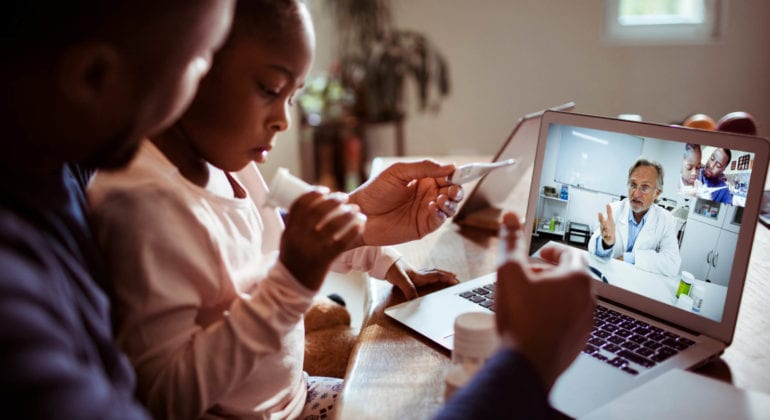2020 divided the world physically yet connected it virtually. With businesses shifting to remote work, mental health practices also went online—and in turn helped to create more access to quality mental health care. The Chicago School was particularly poised to help practitioners transition their practices and to partake in outreach to marginalized communities who otherwise wouldn’t have access.
“In a world experiencing multiple pandemics, securing mental health care can be challenging,” says Susan Foster, Ph.D., department chair of the Counselor Education and Supervision program. “As counselor educators and supervisors, our faculty believes that telehealth bridges barriers and provides access to care that may otherwise be unattainable.”
During the spring of 2020, Dr. Foster worked with faculty members at The Chicago School and the Institute for Professional and Continuing Studies on a free telehealth training. The program taught participants how to use specific types of technology, develop and manage online courses, and engage in online communities using innovation and connection. It also offered guidance on developing screening, verification, documentation procedures, and tools for clients and supervisees as well as disclosure and informed consent for telehealth services—in addition to general relationship building via telehealth relating to boundaries, confidentiality, and standards of care.
The result, according to Dr. Foster, was monumental.
“Because we were able to help train our students, site supervisors, and other stakeholders in the community, we have facilitated the delivery of ethically sound and evidence-based telehealth services over the last year,” Dr. Foster says about the training. “Cultivating a virtual community is important. We believe that using best practices in online learning is vital to the success of our students and our programs, ultimately having a lasting effect on the communities we serve.”
In addition to this training, the Virtual Clinical Training Center (VCTC), an integrative tele-behavioral health program within the Counselor Education and Supervision department, trains student counselors to provide health services to medically underserved populations. The VCTC, the only center of its kind for an online campus, has referred people to services they wouldn’t have had access to otherwise through community partners.
With traditional and telehealth modalities, the Counselor Education and Supervision program is both innovative and true to the core of counselor education, keeping an eye on future trends, the evolution of telehealth, and all of the changes that have resulted from COVID-19. As part of their capstone project, students take the Board Certified TeleMental Health Provider exam. With this built into the program, this credential sets students apart after graduation—especially in this new reality post-COVID-19.
The Chicago School’s other programs are also contributing to its growing reputation on providing telehealth service. Every spring, the Clinical Mental Health Counseling department hosts its premier virtual conference with 84 presenters and 5,000 participants. The conference provides opportunity for scholarship and research, interacting with others for planning or presenting, and peer review. This year’s annual Virtual Conference will take place April 6 to 9.
Given all the lessons of the previous year, Dr. Foster looks ahead to what The Chicago School can do even better to amplify and increase their telehealth offerings.
“We are working to provide more culturally diverse and relevant services to communities in need,” Dr. Foster says. “We are currently working on breaking language barriers. Several of our faculty are learning Spanish, and we are recruiting bilingual counseling interns to provide supervised telehealth counseling services to current and future partner agencies.”
Learn more about The Chicago School
Explore more information about our programs available at The Chicago School today by filling out the form below to request more information. You can also apply today through our application portal.

